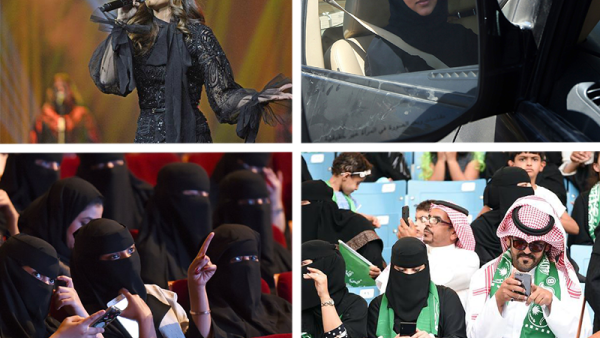by Rosie Alfatlawi
Commentators have rushed to praise Saudi Arabia’s “reform” program under King Salman and his son Crown Prince Mohammed.
Thomas Friedman of the New York Times was criticized last month for an enthusiastic piece on Bin Salman, which claimed Saudi Arabia is “going through its own Arab spring.”
Some journalists claimed it was “fawning and shameless.” In fact, historian Abdullah al-Arian pointed out, the Times had repeatedly described Saudi royals as reformers across decades.
Instead of something new, MBS’ “reform process” as Friedman called it, formed part of a pattern in which Saudi regimes were backed up by the foreign media and Western governments.
So, how novel actually are all the “firsts” that have been hailed across recent months? Here are five occasions in which Saudi reforms were not as dramatic as reports claimed them to be.
1. First Female Ambassador
It was enthusiastically reported in international media this week that a Belgian woman would become the world’s first female envoy to Saudi Arabia.
Dominique Mineur will head up the country's Riyadh embassy from next summer.
“Belgium appoints world's first FEMALE ambassador to Saudi Arabia in 'clear signal' to the Islamic country about women's rights,” proclaimed the Daily Mail.
But similar headlines had been used a full seven years previously.
Wasn’t Georgia’s ambassador a female? https://t.co/9xapEMCNf6
— AbdulrahmanAlFayhani (@bo3of) December 18, 2017
“Riyadh gets first woman envoy,” Arab News had exclaimed, “Georgian woman to become first female ambassador to Saudi Arabia,” said Sputnik.
Yekaterina Makering Mikadze, who was the Georgian ambassador to Kuwait, had also represented her nation in Saudi Arabia, Qatar, Oman, the U.A.E and Bahrain.
She was received by then Saudi King Abdullah as the representative of her nation.
This information has been included only briefly at the end of articles about the Belgian ambassador, perhaps as it does not fit with the narrative of dramatic change in Saudi Arabia.
In fact, a number of women have held senior diplomatic posts in the Gulf nation. Susan Ziadeh was made Deputy Chief of Mission at the U.S. Embassy Riyadh in 2009. The same year, her Finnish counterpart was also a woman, Ulla Maija Nevalainen.
Belgium is not the first to appoint lady ambassador to Saudi Arabia. Reporters do your homework.
— Paul Sullivan (@DrPJSullivan) December 19, 2017
2. First Cinemas
Earlier this month, RT declared “Saudi Arabia to finally open first cinemas in early 2018,” while Jordan’s Roya said “first cinema to open in Saudi Arabia in March.”
But the movie theaters to be launched in the coming year are not the “first” in the kingdom at all.
In fact, as other news sites pointed out, the recent change would lift a 35-year ban, going back to 1980.
Still, in presenting this as a dramatic “reform,” publications have ignored the gradual nature of change on this matter.
Back in 2008, for instance, the conservative kingdom hosted its first film festival. It has done so again every year since 2015.
In Dec. 2015, the country’s cinema committee announced plans to open the country's first-ever theater, again according to Al Arabiya.
- The New York Times' Long History of Praising Saudi 'Reform'
- Saudi Arabia rolls out the red carpet for their second film festival in SEVEN years!
3. First Female Concert
“Saudi Arabia hosts first-ever concert by female performer,” read an Independent headline from Dec. 9.
Lebanese singer Hiba Tawaji had performed for a women-only audience in Riyadh.
That claim was so weak, the Independent article actually contradicted itself, pointing out that “Greek violinist Yianni had performed a mixed-gender show this month.”
Added to that, in her 2014 book “Music and Traditions of the Arabian Peninsula,” Lisa Urkevich gave detailed accounts of female professional musicians in Saudi Arabia going back to 1829.
Multiple quotes from the nineteenth century, and the 1950s, show that women have long performed music in Saudi Arabia.
According to these historic reports, the musicians in question were Saudi women “of a higher class,” as opposed to slaves.
Other than the female singers who have previously performed in Saudi through cultural exchange programs such as American Music Abroad. https://t.co/P1m47Wst2R
— Kip Whittington (@KipTWhit) December 7, 2017
4. First Woman in Saudi Government
In September, news headlines reported “Saudi Arabia appoints first woman to senior government post,” after Eman Al-Ghamidi was made assistant mayor of Al Khubar province.
However, as early as 2009, Norah Al Faiz had become the first Saudi woman to hold cabinet-level office.
She was named deputy minister of education in charge of women’s affairs that year, in what she called “a source of pride for all women.”
The appointment was even praised in a piece that year entitled “Reforms in Saudi Arabia Under King 'Abdallah” from the Middle East Media Research Institute.







